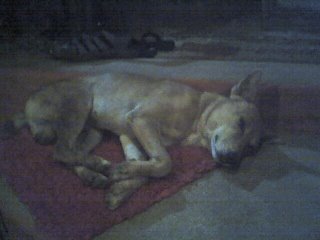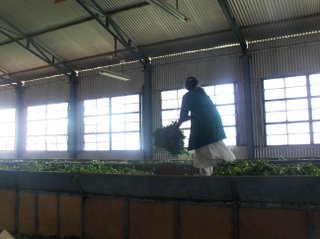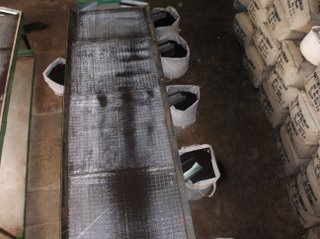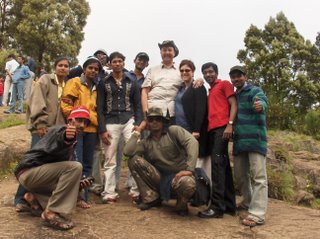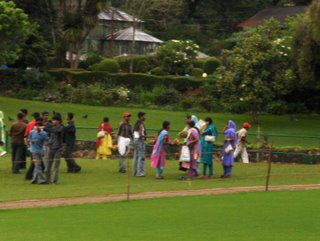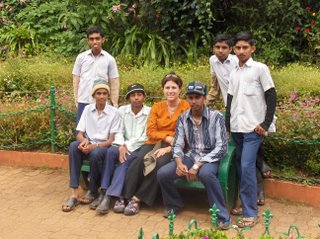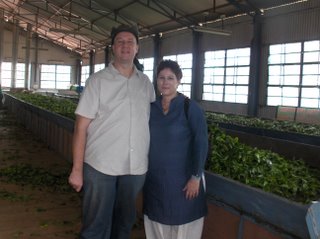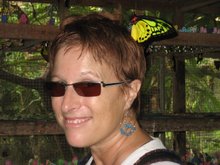In happier news ~

As I was ill and we have been to Bangkok a couple times before, we didn't tour much there; we mostly took care of errands. Imagine our joy when, for the first time in a month, we bought a SIM card and our phones just worked, with no photo IDs or letters from police commissioners required! We saw Happy Feet at the IMAX theater; it was very funny and sweet, a well-done mix of Rudolf the Red-Nosed Reindeer, Madagascar, and Over the Hedge. Bangkok had its Christmas decor up and music playing. I missed my family, so much, and was glad that before the trip I got to spend time in WA with Mom and Mel and I had a faux Thanksgiving dinner with SF Bay Area family. I'm also making extensive use of my cell phone.
Surprisingly, there was good food to be found in the Bangkok mall food court ~ a more hygienic and comprehensive version of the street stall foods (not that they should be missed either). You are given a card upon entering, and can eat from any number of cuisines, all cooked up fresh and delish as you order, and pay just one bill on the way out. We also dined at our favorite Bangkok restaurant, Le Lys, which is owned by a French/Thai couple, major yum.
We flew from Bangkok to Krabi province on the west coast, then took a taxi/ferry to the island of Koh Lanta in the Andaman Sea. Ban Saladan is the major "town," on Lanta, consisting of a few streets; we had the taxi drop us at the major intersection and went in search of Eric's German friends' dive shop, Lanta Fun Divers, which turned out to be about two doors down from the intersection. Ulli and Louise were both there, Ulli gave us a ride to his friend's resort on the beach, and Ulli and Louise joined us for drinks the first couple nights. Then Ja-el (my transliteration), owner of Where Else! resort picked us up in her vintage cream-colored Mercedes, and we have parked ourselves in sanctuary there for the duration of the holidays.
In Thailand, most businesses are owned by women, and women usually control the finances. There is also a law stating that a woman's underwear must hang on the line below her husband's. I think I could live with this, as long as I got to pick my own underwear. Who regulates these things?!
Where Else! has got da funk:
http://www.thai-tour.com/thai-tour/South/Krabi/hotel/where-else/index.html
and the folks who run it are laid back and friendly. Our simple, happy bamboo hut is our home, and comes complete with my favorite type of bathroom: outdoor (private), surrounded by a bamboo fence. Festooned with shells and coral, it is the first bathroom I've had with a palm tree growing in the middle of it. Showering in the sunshine or under the stars is bliss. Too, resident hermit crabs, geckos, frogs, and lizards make for great company.
We spend our days on Lanta getting up late (heat + humidity + activity + music playing somewhere on the beach/noisy neighbors/bleating goat herd invading restaurant in the middle of the night = us conked out early a.m.), reading/sleeping in hammocks, hiking/rock scrambling/wading to other beaches, and snorkeling, and Eric goes scuba diving.
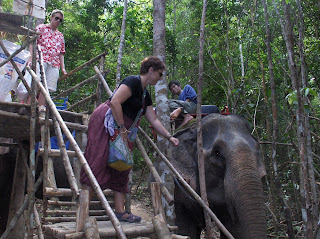 Yesterday we took a tour to a waterfall and cave, riding on the back of an elephant. Usually I don't like attractions that exploit animals, but the story on this is that due to anti-deforestation laws invoked a couple years ago, a large number of domesticated elephants were without work/upkeep, so it was decided to use them for tourist rides. The elephants seemed well cared for. I fed mine a pineapple, which she took with her trunk and chewed whole. It was fun and I got to see part of the island I hadn't seen before. Still, the trail was tough and it seemed pretty laborious for the elephant; next time I think I'll hike it.
Yesterday we took a tour to a waterfall and cave, riding on the back of an elephant. Usually I don't like attractions that exploit animals, but the story on this is that due to anti-deforestation laws invoked a couple years ago, a large number of domesticated elephants were without work/upkeep, so it was decided to use them for tourist rides. The elephants seemed well cared for. I fed mine a pineapple, which she took with her trunk and chewed whole. It was fun and I got to see part of the island I hadn't seen before. Still, the trail was tough and it seemed pretty laborious for the elephant; next time I think I'll hike it. The gorgeous tourist beaches here are surprisingly quiet, considering that this is the busiest time of the year. Louise said that business is still slow post-tsunami/SARs/Avian flu scares. Additionally, most of the resorts here are small with around 20 or so rooms, so they don't fill up beach blanket-to- beach blanket like some tourist beaches. Also, we have found that if you go past the tourist beach, there are often undeveloped beaches and coves with fewer or no people. The undeveloped areas also still have some artifacts of the tsunami, mostly felled coconut and other trees, rusty cans, bottles, Styrofoam, and shoes--mostly flip/flops. The shoes bother me the most; I hope the owners dropped them to run better to high ground.
The gorgeous tourist beaches here are surprisingly quiet, considering that this is the busiest time of the year. Louise said that business is still slow post-tsunami/SARs/Avian flu scares. Additionally, most of the resorts here are small with around 20 or so rooms, so they don't fill up beach blanket-to- beach blanket like some tourist beaches. Also, we have found that if you go past the tourist beach, there are often undeveloped beaches and coves with fewer or no people. The undeveloped areas also still have some artifacts of the tsunami, mostly felled coconut and other trees, rusty cans, bottles, Styrofoam, and shoes--mostly flip/flops. The shoes bother me the most; I hope the owners dropped them to run better to high ground. The hotel has nightly music; usually a DJ, with live bands on Fridays. One big party "for remembering and forgetting the tsunami" (two years ago)
featured a reggae band we enjoyed, called JOB2DO. The party was a benefit for Lanta elementary school; they raised ~13k baht, which Ja-el said was good. Locals and tourists filled the outdoor restaurant, bar, and other gathering areas. A fire spinner named Wen, friendly and lit up from the inside as well as with her spinning poi, entertained the crowd before the show.
We also had a probable, (what we call) LoveYouLongtime couple sighting at the party: a (usually) older western guy with a young Thai woman, she presumably a paid escort, although you can't always tell. She was quite bubbly, obviously intimate with him, and giggled and whispered to her Thai girlfriend while rolling her eyes in his direction. (Statistically, 90-something percent of all johns in Thailand are Thai; most prostitution is centered in only a couple of tourist areas in Thailand.)
The Thai actually have a word for middle-aged farang (foreign) women who are bitter because middle-aged western men are only interested in Thai girlfriends (have to look up that word). There's also a word for middle-aged western boyfriends who dye their hair bright red to cover up their gray while visiting their Thai GF's relatives in the provinces: Ronald McBoyfriend.
One day we went snorkeling at Koh Ha (translation: five islands) with Ulli and Louise's crew, other snorkelers, and a few scuba divers. The first dive was close to a beach, where we saw coral, sea cucumber, barracuda, parrot fish (so colorful and pretty!), rabbit fish, purple star fish, and jellyfish, among others. Also cool was swimming over the scuba divers, watching them walk like moon men on the ocean floor, and me swimming through their air bubbles, which floated up like mushroom-shaped jellyfish.
On the second dive, we parked the boat on the other side of the island, with no beach. One of the dive masters told me and Eric that there was a lot to see at the far point of the island, so Eric and I made our way there, enjoying the view as the current carried us to the point. After a while, the current got stronger and choppier, and visibility became poor. We decided to make our way back toward the boat, turned onto our backs, and started kicking our flippered feet against the now quite forceful current. I kicked and kicked, but didn't feel like I was getting anywhere; using a big indentation in the rockface as a marker confirmed this as I kept swimming as hard as I could, checking the marker every few minutes. After some time, I became fatigued and discouraged as I realized I had been moving farther out away from the island and Eric, but no closer to the boat. Eric was farther along than I and said that I was making some progress, it was just slow. So I kept kicking and stroking, hard as I could. I started feeling like I couldn't keep it up, but if I stopped the current would take me farther out or swallow me altogether. I could see how people could panic, or lose all strength and drown. I wondered if there was some point where they just gave up or if the waves made that decision for them. I knew I couldn't make it all the way to the boat. I called to Eric (who has taken dive master emergency lessons and has helped save one person) to wait for me and asked him if he could help tow me. I finally made my way to him and we linked arms, kicking together. Still it seemed we weren't getting anywhere. Finally the boat started up, picking us up and then rounding the bend to pick up other divers.
One day we walked, rock scrambled, and waded along several beaches to find Otto, proprietor of Otto's Bar and restaurant. Otto's Bar had been demolished in the tsunami, and Otto rebuilt a few beaches down. Otto and his bar have both been upgraded; his bar/restaurant is now much larger (funk retained) and Otto is married with child. Sad note: Eric remembers when Otto used to sew coffee filters by hand; now Otto has switched to Nescafe! Happy note: the tamarind prawns still rock.
On New Year's Eve, we took a nap from 8:30 p.m. to 11:30 p.m., then sat on the beach as people shot off fireworks. Up and down the coast, people lit and let fly Chinese lanterns. These are papery rectangles with a fire lit underneath; as with hot air balloons, the heat from the fire makes the lantern fly. They ascended like graceful ghosts from along the expanse of the beach, and caught an air current that brought them all together at one point in the sky.

Here's our (subject to inevitable change) schedule for January and February:
Thailand:
Jan 4: Leave Lanta, arrive on Phuket
Jan 5: Leave Phuket, arrive in Ranong
Jan 6: Visa run (to extend our Thai visas) from Ranong Thailand to Myanmar and back
Jan 7: Leave Ranong, arrive Champhon
Jan 8: Leave Champhon, arrive Phetchuburi
Jan 9-11: Phetchuburi -- cool temples and stuff
Jan 12: Leave Phatchuburi, arrive Ayuttaya
Jan 13-24 Ayuttaya --ruins, _____?___ National Park
Jan 25: Leave Ayuttaya, arrive Aranya
Jan 26: Leave Aranya
Cambodia
Jan 26: Arrive Siem Reap
Jan 27-Feb 1: Explore Ankor (temples/ruins)
Feb 2: Leave Siem Reap, arrive Phnom Penh
Feb 3: Leave Phnom Penh (Or stay a day or so more; Eric's friend has an apartment there)
Vietnam
Feb 3: Leave Phnom Penh, arrive Ho Chi Min City/Saigon (HCMC)
Feb 4: Visit HCMC
Feb 5: Leave HCMC
Feb 7: Arrive Hoi An
Feb 8-20: Explore Hoi An, daytrips, FEB 10 DRINKIES!!!
Feb 21 Leave Hoi An for other Vietnam destinations, TBD
